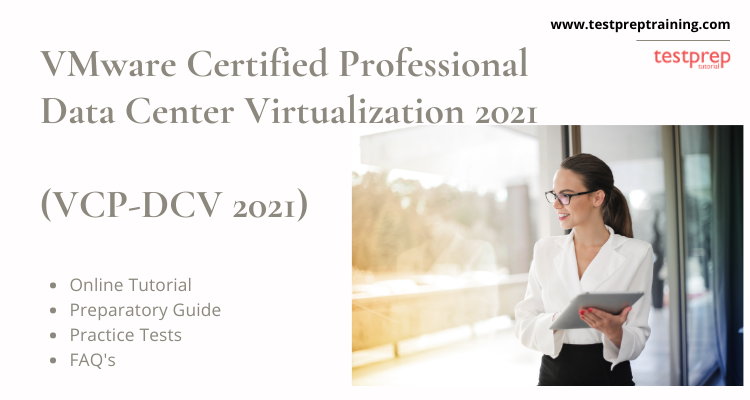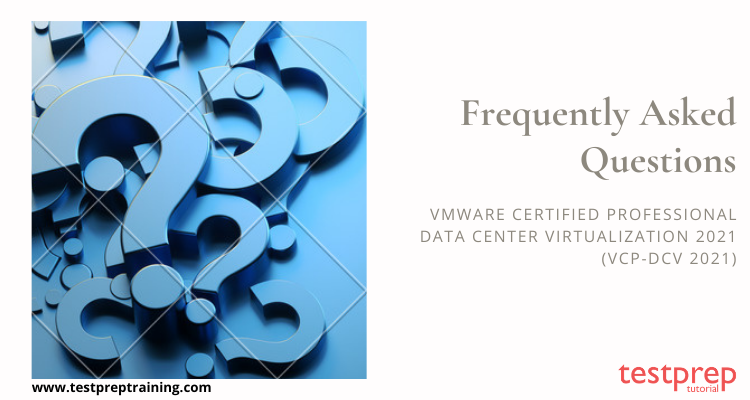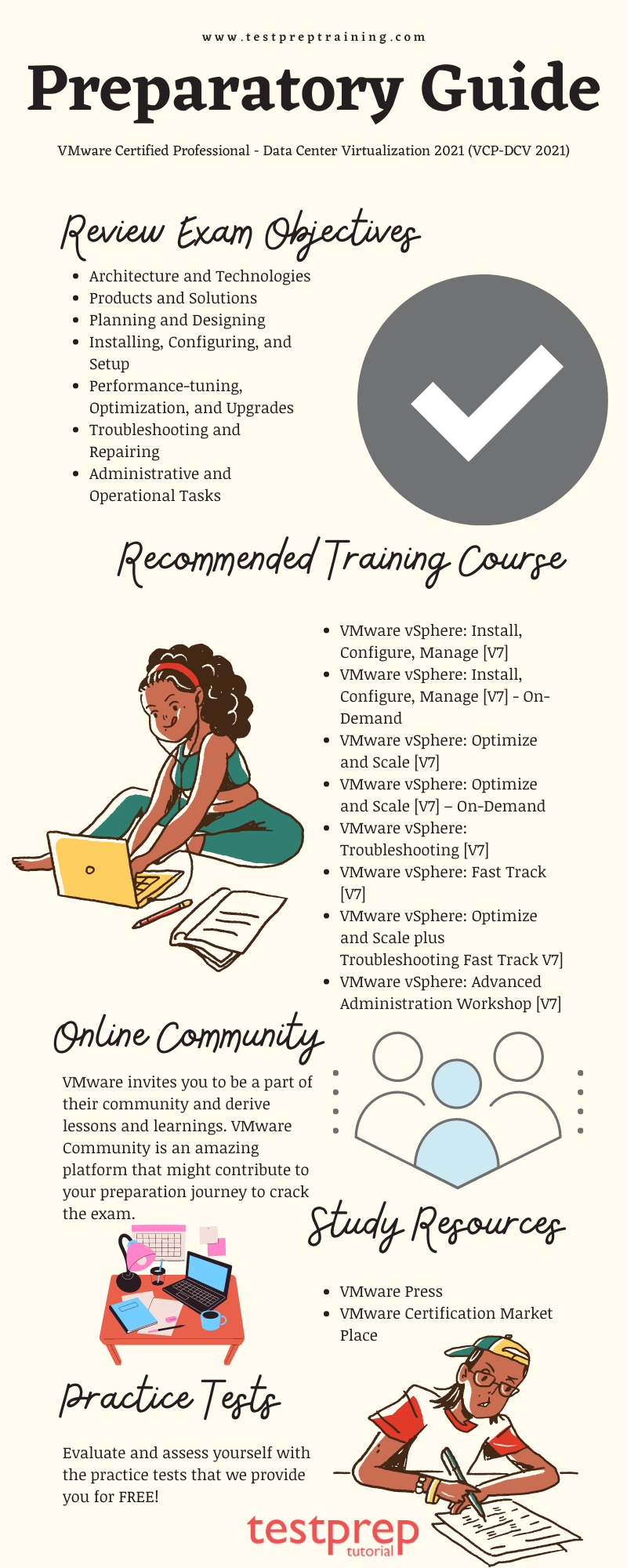VMware Certified Professional – Data Center Virtualization 2021 (VCP-DCV 2021)

The VMware Certified Professional – Data Center Virtualization 2021 (VCP-DCV 2021) certification is an industry-recognized certification that validates the skills and knowledge required to design, deploy, and manage VMware vSphere environments. The certification is designed for IT professionals who work with virtualized infrastructure and want to demonstrate their expertise in virtualization technologies.
To earn the VCP-DCV 2021 certification, candidates must pass the VMware Certified Professional – Data Center Virtualization 2021 Exam (2V0-21.21). The exam covers topics such as configuring and administering vSphere storage, networking, security, and troubleshooting. Candidates must also have experience working with VMware vSphere technologies and complete a VMware-authorized training course.
The VCP-DCV 2021 certification is valid for two years and requires candidates to recertify every two years to maintain their certification status. VMware offers a range of recertification options, including completing a new version of the exam, earning a higher-level certification, or completing a designated continuing education course.
Overall, the VCP-DCV 2021 certification is a valuable credential for IT professionals who work with virtualized infrastructure and want to demonstrate their expertise in VMware vSphere technologies.
Pre-Requisites
Since VCP-DCV 2021 is a professional level certification, it is required to pass and get certified with the associate level exam before it. Therefore, VCTA-DCV 2021 certification is the pre-requisite for VCP-DCV 2021 certification.
VCP-DCV 2021 Exam Details
- The Professional VMware vSphere 7.x Exam (2V0-21.20), which leads to the VMware Certified Professional – Data Center Virtualization 2021 credential, is a 70-item, scaled-passing exam with a passing score of 300.
- Candidates are given a total exam period of 130 minutes, which provides enough time for non-native English speakers to complete the exam.
| Exam Name | Professional VMware vSphere 7.x |
| Exam Certification | VMware Certified Professional – Data Center Virtualization 2021 (VCP-DCV 2021) |
| Exam Number | 2V0-21.20 |
| Exam Partner | Pearson VUE |
| Exam Duration | 130 minutes |
| Number of Questions | 70 |
| Passing Score | 300/500 |
| Exam Format | Single and multiple choice |
| Mode of Exam | Online proctored |
| Language | English |
| Exam Fees | US$250 |
Frequently Asked Questions : VCP-DCV 2021
Visit HERE to refer to the Frequently Asked Questions section.

Retake Policy
- There is a week’s (7-day) waiting period after all failed attempts for proctored VMware Certified Professional (VCP) exam. Once a candidate passes a proctored exam, they cannot take that exam again until a new major exam’s revised version is released.
Re-Certification Policy
- VMware certifications do not have any mandatory requirement for recertification.
- Recertifying by upgrading your certifications or earning a higher-level certification will keep your expertise up-to-date and further enhance your ability to provide the highest quality results.
Let’s checkout some sample questions before moving ahead.
1. What is the minimum number of vSphere hosts required to form a vSphere cluster?
A) One
B) Two
C) Three
D) Four
Answer: C) Three
2. Which vSphere feature allows a virtual machine to automatically move from one physical host to another during maintenance or hardware failure?
A) High Availability
B) Fault Tolerance
C) vMotion
D) Distributed Resource Scheduler
Answer: C) vMotion
3. What is the maximum number of vCPUs that can be assigned to a virtual machine in vSphere 7?
A) 16
B) 32
C) 64
D) 128
Answer: D) 128
4. Which vSphere feature provides a centralized location for managing storage resources and allows for the creation of virtual machine disk files?
A) Virtual Volumes
B) Storage vMotion
C) Storage DRS
D) Virtual SAN
Answer: A) Virtual Volumes
5. Which vSphere feature allows for the creation of virtual networks that are isolated from the physical network infrastructure?
A) vSphere Distributed Switch
B) NSX-T Data Center
C) vSphere Standard Switch
D) Network I/O Control
Answer: B) NSX-T Data Center
Please note that these sample questions are for informational purposes only and are not indicative of the actual exam content. The actual exam questions may vary in format and difficulty.
Course Outline
Architectures and Technologies
- Identify the pre-requisites and components for a vSphere implementation
- Describe vCenter Server topology
- Identify and differentiate storage access protocols for vSphere (NFS, iSCSI, SAN, etc.)
- Describe storage datastore types for vSphere
- Explain the importance of advanced storage configuration (vSphere Storage APIs for Storage Awareness (VASA), vSphere Storage APIs Array Integration (VAAI), etc.)
- Describe storage policies
- Describe basic storage concepts in K8s, vSAN, and vSphere Virtual Volumes (vols)
- Differentiate between vSphere Network I/O Control (NIOC) and vSphere Storage I/O Control (SIOC)
- Describe instant clone architecture and use cases
- Describe ESXi cluster concepts
- Firstly, Describe Distributed Resource Scheduler (DRS)
- Secondly, Describe vSphere Enhanced vMotion Compatibility (EVC)
- Thirdly, Describe how Distributed Resource Scheduler (DRS) scores virtual machines
- Fourthly, Describe vSphere High Availability
- Lastly, Describe datastore clusters
- Identify vSphere distributed switch and vSphere standard switch capabilities
- Describe VMkernel networking
- Manage networking on multiple hosts with vSphere distributed switch
- Describe networking policies
- Manage Network I/O Control (NIOC) on a vSphere distributed switch
- Describe vSphere Lifecycle Manager concepts (baselines, cluster images, etc.)
- Describe the basics of vSAN as primary storage
- Identify basic vSAN requirements(networking, disk count + type)
- Describe the vSphere Trust Authority architecture
- Explain Software Guard Extensions (SGX)
VMware Products and Solutions
- Describe the role of vSphere in the software-defined data center (SDDC)
- Identify use cases for vCloud Foundation
- Then, Identify migration options
- Furthermore, Identify DR use cases
- Describe vSphere integration with VMware Skyline
Planning and Designing – There are no testable objectives for this section.
Installing, Configuring, and Setup
- Describe single sign-on (SSO) deployment topology
- Configure a single sign-on (SSO) domain
- Join an existing single sign-on (SSO) domain
- Configure VSS advanced virtual networking options
- Set up identity sources
- Configure Identity Federation
- Then, Configure Lightweight Directory Access Protocol (LDAP) integration
- Lastly, Configure Active Directory integration
- Deploy and configure vCenter Server Appliance
- Create and configure VMware High Availability and advanced options (Admission Control, Proactive High Availability, etc.)
- Deploy and configure vCenter Server High Availability
- Set up a content library
- Configure vCenter Server file-based backup
- Analyze basic log output from vSphere products
- Configure vSphere Trust Authority
- Configure vSphere certificates
- Describe Enterprise PKIs role for SSL certificates
- Configure vSphere Lifecycle Manager/VMware Update Manager (VUM)
- Securely Boot ESXi hosts
- Configure different network stacks
- Configure Host Profiles
- Identify boot options
- Configure Quick Boot
Performance-tuning, Optimization, Upgrades
- Identify resource pools use cases
- Explain shares, limits, and reservations (resource management)
- Monitor resources of vCenter Server Appliance and vSphere environment
- Identify and use tools for performance monitoring
- Configure Network I/O Control (NIOC)
- Configure Storage I/O Control (SIOC)
- Explain the performance impact of maintaining virtual machine snapshots
- Plan for upgrading various vSphere components
Troubleshooting and Repairing – There are no testable objectives for this section.
Administrative and Operational Tasks
- Create and manage virtual machine snapshots
- Create virtual machines using different methods (Open Virtual Machine Format (OVF) templates, content library, etc.)
- Manage virtual machines
- Manage storage (datastores, storage policies, etc.)
- Configure and modify datastores (expand/upgrade existing datastore, etc.)
- Create virtual machine storage policies
- Configure storage cluster options
- Create Distributed Resource Scheduler (DRS) affinity and anti-affinity rules for common use cases
- Configure and perform different types of migrations
- Then, Configure role-based user management
- Furthermore, Configure and manage the options for securing a vSphere environment (certificates, virtual machine encryption, virtual Trusted Platform Module, lock-down mode, virtualization-based security, etc.)
- Configure and manage host profiles
- Utilize baselines to perform updates and upgrades
- Utilize vSphere Lifecycle Manager
- Firstly, Describe Firmware upgrades for ESXi
- Secondly, Describe ESXi updates
- Thirdly, Describe component and driver updates for ESXi
- Fourthly, Describe hardware compatibility check
- Lastly, Describe ESXi cluster image export functionality
- Configure alarms
Preparatory Guide – VCP-DCV 2021

1. Review Exam Objectives
Knowing the exam objectives is very important to get an insight into the exam. Visit the Official website of VCP-DCV 2021 to have a clearer view of the exam guide. A thorough analysis will let you align yourself more deeply with the chief objectives of the exam, hence, enabling you to gain the required command to earn your desired certification. Below are the major domains of the course outline for the exam:
- Firstly, Architecture and Technologies
- Secondly, Products and Solutions
- Thirdly, Planning and Designing
- Fourthly, Installing, Configuring, and Setup
- Furthermore, Performance-tuning, Optimization, and Upgrades
- Moreover, Troubleshooting and Repairing
- Lastly, Administrative and Operational Tasks
2. Recommended Training Course
VMware provides integrated training courses for you to prepare for the exam.
- Firstly, VMware vSphere: Install, Configure, Manage [V7]
- Secondly, VMware vSphere: Install, Configure, Manage [V7] – On-Demand
- Thirdly, VMware vSphere: Optimize and Scale [V7]
- Fourthly, VMware vSphere: Optimize and Scale [V7] – On-Demand
- Then, VMware vSphere: Troubleshooting [V7]
- Furthermore, VMware vSphere: Fast Track [V7]
- Moreover, VMware vSphere: Optimize and Scale plus Troubleshooting Fast Track V7]
- Lastly, VMware vSphere: Advanced Administration Workshop [V7]
Above mentioned are courses that helps you understand and cover the exam objectives, ultimately preparing you for the final exam. You can explore VMware Learning Path to find help you identify the training courses as per your requirement.
3. Online Community
Being a part of online communities is a great way to learn. VMware invites you to be a part of their community and derive lessons and learnings. VMware Community is an amazing platform that might contribute to your preparation journey to crack the exam.
4. Study Resources
Next, we come down to the most important and the most common resource of preparation for the exam that is books. Following are the web addresses that VMware provides, where you can find the right books for your preparation.
5. Practice Tests
Last but not the least, practising! Attempting practice tests completes your preparation for the examination. Evaluate and assess yourself with the practice tests that we provide you for FREE!

